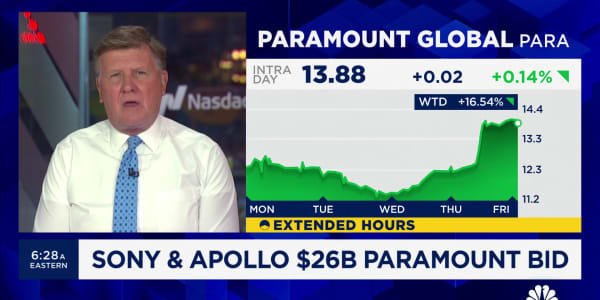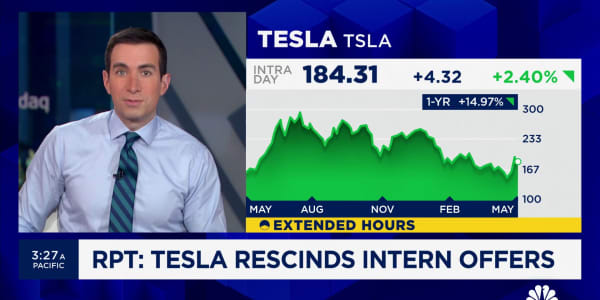Did you make this week's list?
It's been a week of seeing double in the markets, which is fitting for a week when the Fed speaks, since every word from Ben Bernanke is interpreted in at least two ways.
In real life, you can win and lose at the same time, too (yes, everyone's a winner!). That's kind of what happened to a big bank this past week.
Cyberbusiness makes our list twice, too.
As did short sellers, but not for the pessimistic reasons they live and breathe for, and usually profit from.
And with only a week until Black Friday (or less ...) shopping is a big focus of this week's Executive Edge biggest winners and losers in the market:
Winner: Bitcoin
Lots of us are only vaguely aware of bitcoin, imagining the virtual currency is, well, something computer gamers use to buy ray guns. In fact, it's real currency that hit an all-time high this week, at one point up more than 11-fold over the past year, as more investors become aware of it and more confident about putting it to use—even to pay for sandwiches at Subway.
The future, though, is cloudy, as various regulators consider tightening the rules for bitcoin use and trading. Congressional hearings began, with regulators apparently willing to let crypto-currencies stay in circulation, but likely to impose rules to curb money laundering and other illegal uses.
Quotes:
"I think it's awesome. I feel like once the word gets out, it could really spread like wildfire."
—Adam Welsh, a customer who used bitcoin to buy a Subway sandwich in Allentown, Pa.
"Credit card transaction fees are going to average 2 percent to 3 percent, with some as high as 5 percent. So with bitcoin you pay less than 1 percent."
—Brooklyn, N.Y., store owner Daniel Lee
Loser: Data miners
Cutting-edge executives know it's all about data. Every bit you can learn about your customers makes for better products and marketing. But too much looking over the shoulder is creepy, and parents and other critics are especially wary of data mining of young teens.
The Do Not Track Act of 2013, introduced last week, extends protections already in place for kids 12 and under. If passed, the bill would require parental consent for data to be collected on children 13 and under. For 13- to 15-year-olds, data miners would need the user's consent. The bill also includes an "eraser button" requirement, similar to one in California, to allow young users to delete personal information they don't want to share.
Quote:
"It's a big deal for me. I have six precious little souls whose privacy I want to protect."
—Bill sponsor Rep. Joe Barton, R-Texas, who has an 8-year-old son and five grandchildren under 14
Winner: Big banks
One of the biggest pieces of unfinished business from the financial crisis is the Volcker Rule, meant to rein in risky trading by banks. Now, after years of wrangling over just what the rule will say, the Federal Reserve is thinking of delaying its full implementation, currently next July, by 12 months.
A final proposal probably won't be released until December, and that would leave banks less than a year for the complex business of compliance.
The rule, which could be implemented in stages, would limit banks proprietary trading and force them to stop investing in vehicles like hedge funds and private equity funds.
Loser: Short sellers
With many decisions, not only must you be right, you have to be right at the right time.
That's one of the problems confronting short sellers, many of whom have been losing money holding out for a market plunge they are sure is inevitable. With stocks going up and up, several short-selling funds have recently closed, and the average short-based hedge fund was down nearly 17 percent this year through October.
Those funds have lost big every year since 2008, with the exception of a miniscule gain in 2011, and many of the most heavily shorted stocks, such as Tesla, Chipotle, Netflix and Best Buy, have gone up even more than the broad-market indexes.
Many short sellers are now clinging to the hope that the end of the Fed's quantitative easing will torpedo many stocks. But other experts think QE may have successfully primed the economic engine. Oppenheimer predicts the S&P 500 can produce double-digit returns next year.
Quote:
"This is it. It's the bottom of the ninth and we're about to hit a home run. I believe this is the best opportunity I will see in my life as a short seller."
—Shorting expert John Fichthorn, co-founder of Dialectic Capital Management
Winner: Shoppers
When we talked a while back about Christmas shopping starting on Labor Day, we were joking. But any minute now isn't out of the question. Wal-Mart said this week that it's going to start Black Friday deals a week early. Today, that is. Last week, Wal-Mart said it would start only a day early, on Thanksgiving itself, but the chain now it feels compelled to match its eager-beaver rivals Sears and Kmart.
Retailers face a shorter-than-usual Thanksgiving to Christmas period and modest sales projections. In fact, Best Buy shares dropped by more than 10 percent during Tuesday's session after the firm, while announcing a nice earnings bump, vowed to compete in the increasingly aggressive holiday discounting battle. A National Retail Federation study found that 53.8 percent of consumers had already started their holiday shopping last week.
Quote:
"If our competition is in fact more promotional in the fourth quarter, we will be too, and that will have a negative impact on our gross margin."
—Best Buy Chief Financial Officer Sharon McCollam
Loser: Men's Wearhouse
Last week, Jos. A. Bank, the men's clothing chain, withdrew its offer to merge with troubled Men's Wearhouse, citing the larger chain's refusal to negotiate. On Wednesday, the largest shareholder in Men's Warehouse cranked up pressure to revive the deal by pushing for bylaw changes making it easier to oust board members who won't go along.
Eminence Capital CEO Ricky Sandler, whose firm owns nearly 10 percent of Men's Wearhouse, says the board gave up nearly $2 billion in value when it passed on the offer.
Quote:
"If it takes us to next October to get full control of the board and effect the merger here, we're prepared to do that."
—Ricky Sandler, Eminence Capital
Winner: J.C. Penney
Strivers don't generally settle for gentlemen's Cs, but if you've been getting Ds and Fs, a C looks pretty good. Shares of troubled retailer J.C. Penney got a nice bump Wednesday after the chain forecast growing same-store sales for the holiday quarter. Sure, losses deepened for the third quarter, but that was not surprising given the costs of dumping merchandise that long-time customers had shunned.
Shoppers seem to have warmed up to Penney's, thanks to a return to old brands and discounting. Penney's reported it had plenty of liquidity, easing one worry. But investors will be watching for an improvement in gross margins, which trail those of rivals like Macy's and Kohl's.
Quotes:
"It was on life-support; now it's in rehab. ... We won't be talking about J.C. Penney a year from now—not because they are not thriving or because they are going out of business, but because they're just nothing. ... If I could shop at other stores than J.C. Penney or Kohl's, then I would. I feel the same way about their stocks."
—CNBC's Jim Cramer
"It shows they have right momentum now, but ultimately we're looking at the fourth quarter."
—Walter Loeb, retail analyst with Loeb Associates
Loser: Abercrombie & Fitch
Once upon a time the name was associated with all sorts of sporty items, even guns. But for years the company's latest incarnation has been just a clothing retailer, aimed at 18- to 22-year-olds on the cutting edge of cool, or who think they are. In this day and age, many shoppers are looking for deep, deep discounts, and others for true luxury.
That spells trouble for Abercrombie, which on Thursday reported deep losses for the third quarter. Shares are down more than 18 percent year over year.
Quote:
"Maybe there aren't as many cool people in this country as we thought, because when you have the significant gross-margin erosion ... that means there's not enough cool people to pay for your stuff."
—CNBC's Jim Cramer
Winner and Loser: JPMorgan Chase
Special bonus category this week! We just couldn't decide if JPMorgan finished the week a winner or loser with all the news, not even including the reported delay in the Volcker rule.
You know that record $13 billion settlement JPMorgan Chase finally agreed to? Well, it may give the government bragging rights but leave JPMorgan laughing all the way to the bank. The case involves subprime and Alt-A mortgages that were bundled into high-risk securities and sold to investors who, the government says, weren't told about all the dangers. So the question is, did the settlement adequately reflect investors' losses?
Analysts have had a tough time determining how many loans inside these securities fell short of underwriting standards. But some note that JPM and its subsidiaries marketed more than $1 trillion in these securities. The $25 billion the bank has set aside for settlements is only 2.5 percent of that total. Critics say the portion of substandard loans had to have been much higher than that.
And yet, you aren't likely to find JPMorgan tweeting its success any time soon.
Bad damage control is worse than no damage control. That's the object lesson in the lashing that JPMorgan Chase took from angry civilians after offering a top executive for a wide-open Q&A via Twitter. Tweeters, it turned out, were mad as hell about the firm's financial miscues. The takeaway: Social media is not a good forum for addressing a complex topic.
A firm that's under the gun needs to show empathy and transparency, and tricky PR problems need the input of—surprise!—PR experts, who might let them know that a little humility goes a long way, and that it's critical to pick the right spokesman for each particular challenge.
Quote:
"Yes, these are big numbers for newspaper headlines. But relative to the losses, they could have been bigger."
—Jeffrey Lewis, a senior portfolio manager at TIG Securitized Asset Fund
"The #AskJPM debacle is a story of hubris, not enough empathy and a huge lack of understanding of the public's frustration and downright anger with JPMorgan's brand."
—Ted Birkhahn, president of Peppercomm
—By Jeff Brown, Special to CNBC.com




